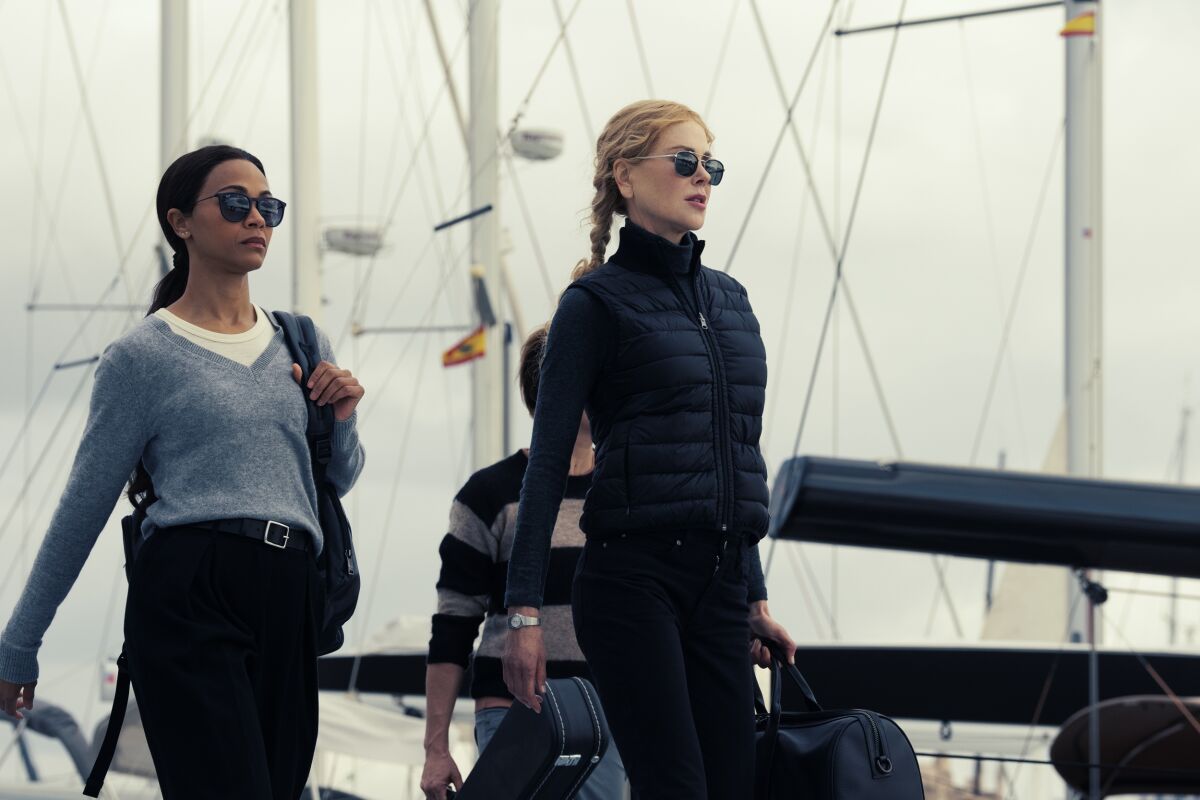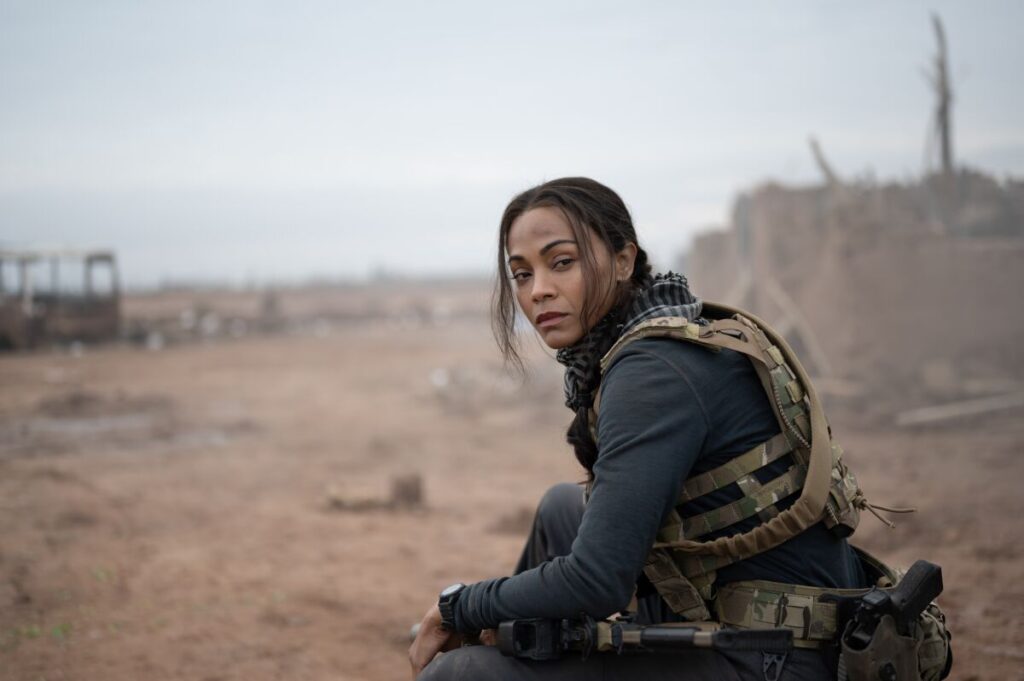Actors know it’s hard for audiences to separate them from their characters. But rare is the case that it’s because they almost have the same name.
In “Special Ops: Lioness,” premiering Sunday on Paramount+, Zoe Saldaña plays Joe. She’s the leader of a female-focused covert CIA organization tasked with flipping or befriending the wives, mothers, girlfriends or other women who have close ties to male terrorist leaders. Joe becomes skittish after an assignment in Syria goes bad, but she has the support of her boss Kaitlyn (Nicole Kidman). So with trepidation, Joe recruits Cruz Manuelos (Laysla De Oliveira), a newly enlisted Marine running from her own trauma, to become the confidant of a high-ranking terrorist’s daughter.
Saldaña isn’t sure where series creator Taylor Sheridan came up with her character’s name (“Is this a coincidence? Or maybe her name is just Joe and is short for Josephine?” she ponders during a Zoom call in June). But she does know the part was written with her in mind.
The actor, most famous for playing the Na’vi warrior Neytiri in the “Avatar” films and the alien Gamora in Marvel Cinematic Universe movies like “Guardians of the Galaxy,” also wasn’t interested in wading into the debate about “red state” versus “blue state” TV, like the one Sheridan ignited last year in an interview with the Atlantic magazine while promoting his Paramount Network hit “Yellowstone” and its prequels that stream on Paramount+.
“I’m such a New Yorker. I have yet to play catch-up on the whole red and blue and purple … I just see humanity; I just see America,” Saldaña says.
Zoe Saldaña on her character, Joe: “This woman is going to be swimming upstream throughout eight episodes.”
(Lynsey Addario / Paramount+ )
But she says she was interested in “an idea of what it’s like to be a person that serves and works for a secretive military program such as the Lioness program.”
“I wanted to understand what makes them do this and what makes them be so selfless,” she says. “Is it for love of country? Is it for duty? Is it like a doctor and you just wake up and know that this is the path you’re gonna follow?”
In an interview conducted before the SAG-AFTRA strike and condensed for clarity, Saldaña spoke about how she researched the role, how it fits in with other projects in the Saldaña Cinematic Universe and how the trained ballerina never gave up her love of dancing.
Like “Lioness,” both the “Avatar” movies and the Marvel films are also about war and the spectrums of “good” and “evil.” Is this something that interests you?
I didn’t even see the correlation. But, oh my God, thank you for pointing that out.
The first 15 pages of the pilot [of “Lioness”], we’re in Syria and all that happens and all of that unfolds. And then that’s the beginning? You’re sort of like, oh my God, like, where’s she going from here?
This woman is going to be swimming upstream throughout eight episodes. You’re going to see her, emotionally, just wrestle with her personal life as her life at home may fall apart and this mission may come undone and you fear that she’s gonna break.
That, to me, was really interesting. Because, also, it’s a woman that’s keeping all this together. And you’re rooting for her because she’s a woman. But here’s the thing: Taylor never, in any single episode, had any woman justify herself, apologize [or] have to fight against the man to be heard or seen. That is not the f— case here. And he did not write chauvinistic male characters surrounding these women. Everybody’s there to make sure that this mission gets done because you are serving your country. That’s it. And that was marvelous to me.
What can you say about Joe’s relationship with Kidman’s character, Kaitlyn?
There is no Joe without Kaitlyn. [The character of] Kaitlyn is probably an [amalgamation] of so many women in service that have to deal, day in and day out, with all the politics in order for them to get a program such as the Lioness program funded.
Obviously, this is based on programs that exist. This is not a real program. I just think it was really important to get a glimpse into a world of espionage but told through the lens of a woman.

Nicole Kidman, right, plays Joe’s boss in “Special Ops: Lioness.”
(Luke Varley / Paramount+)
You’ve talked before about the casting limitations to someone with your skin tone and the freedom “Avatar” or “Guardians” allowed because your characters in those movies weren’t any shade of human skin. In the first episode of “Lioness,” we see Joe undercover in Kuwait in a way that would be suspect if she were white. In this way, is her ethnicity an asset more than a liability?
It’s never discussed. I think that’s subjective. But I think it’s great. I’m pretty sure that maybe it helps her. Maybe, in real life, she would have been a Kaitlyn as well. She would have been the one creating these programs and funding them and hiring someone else.
Maybe if the conflict were, you know, in Russia, she’ll be recruiting different-looking Lionesses. And maybe she will in Season 2 and Season 3. It all depends on where she’s been given a target and what she has to build around it in order to accomplish that mission.
Similarly, people look at you as a fashion and beauty icon. Was it fun or freeing to play someone who could take the glam down?
I didn’t want her to look like a typical government worker. This is a woman that works in a program where she is neither here nor there. You see her today and she’s gone tomorrow. I wanted her to have a very nomadic, dark aesthetic to her style. And, no makeup. This is a woman who, I don’t even think she looks in the mirror when she’s getting ready. She just doesn’t have time.
You have to be as invisible as possible. So putting on any kind of makeup that may draw attention to you — any spark of color that draws attention to you — is counterproductive to what you’re doing and what you need to get done.
Did you interview any actual CIA agents for this role?
I interviewed some people, [including] a child of someone that was a spy. I wanted to know what it was like growing up with someone that lies as a profession. And Taylor surrounded us with ex-military people that had served and had been a part of programs similar to this. [And] I did a lot of movie watching [and] I listened to a lot of podcasts, documentaries, audiobooks.
Did you have to do any fight training?
It wasn’t necessary this season. But I’ve been talking to Taylor and he’s saying that that’s going to change. I wasn’t upset about it. I’ve been doing stunts for over 15 years. I appreciated using my brain as my muscle for this character.
But you do see Joe in action in the last three episodes of the season. So it’s not like I don’t get dirty and go do some work. But it’s not what she does anymore.
We also see the toll that this job takes on Joe’s marriage and family. There’s a suggestion that she and her husband Neil (played by Dave Annable) have an understanding that they can see other people while she’s on a mission.
You’re gonna really root for this marriage to work because they’re really great people. And they believe in what they’re doing a great deal. And they’re a family and their family is really important to them, just like their professions are.
I found it very interesting that Taylor wrote this marriage in this world and you’re gonna watch them, episode after episode, as they’re fighting to keep their family together. And it’s gonna break your heart because it gives you an idea of people that work in this line of work. You just develop a great deal of compassion for them.
You and your husband, writer-director Marco Perego, have three kids. Have you thought about the parallels between this and the long hours you have to spend away from your family to be on film sets?
To be an actor and a full-time parent and a full-time all those hyphenated titles — wife and daughter and community provider — is like serving in the military, I’ll tell you that.
It’s hard; it’s a sacrifice. But it’s not just a sacrifice that I make. It’s a sacrifice that my children make, that my partner makes and that my whole family makes because we’re on the road a lot. But it works. It can work. You just have to work at it every day. Because you just have to know what’s important for you.
What’s important for me is my family and then what I do and my desires as an artist. But I made a choice to start a family and to get married and that’s the same with my career.
I’ll wake up at five o’clock in the morning and I’ll work out and I’ll do this and I won’t eat that and I’ll memorize and I’ll rehearse for seven or eight hours. Well, my personal life demands just as much time, so I can’t be too tired for that. I come home and, inside, you switch hats. And you are a mom and you’re a wife and you are this and you’re that and I’m a taxpayer and a voter and all these things.
The one thing I just don’t mess with anymore is my sleep hours. I can’t even have a glass of wine because it’s going to keep me up at night or it’s going to give me some acid reflux. The sacrifice comes from someplace else. And, for me, it was easy to make that sacrifice to give up my nightlife and my party life and my fun. It’s fine. Keep it. I don’t need it. Because what I’m having in my life is big.
Your breakout role was in the ballet drama “Center Stage.” Do you still dance?
I’m doing a film for Jacques Audiard [called “Emilia Perez”]. I’m singing and dancing. It’s been 25 years and I’ve gone back to my roots. So I’ve been in heaven. My neck is busted because of it, but it’s OK.

